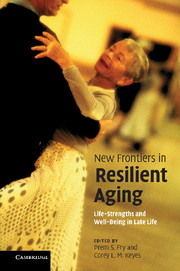Book contents
- Frontmatter
- Contents
- Figures
- Notes on contributors
- Foreword
- Acknowledgments
- Introduction
- 1 Sources of human life-strengths, resilience, and health
- 2 Growth is not just for the young: growth narratives, eudaimonic resilience, and the aging self
- 3 Physical resilience and aging:
- 4 You can teach an old dog new tricks:
- 5 Resilience in the face of cognitive aging:
- 6 Why do some people thrive while others succumb to disease and stagnation?
- 7 Psychosocial resources as predictors of resilience and healthy longevity of older widows
- 8 Resilience and longevity:
- 9 The socioemotional basis of resilience in later life
- 10 Emotional resilience and beyond:
- 11 Risk, resilience, and life-course fit:
- 12 Resilience in mobility in the context of chronic disease and aging:
- 13 Positive aging:
- Index
- References
8 - Resilience and longevity:
expert survivorship of centenarians
Published online by Cambridge University Press: 06 December 2010
- Frontmatter
- Contents
- Figures
- Notes on contributors
- Foreword
- Acknowledgments
- Introduction
- 1 Sources of human life-strengths, resilience, and health
- 2 Growth is not just for the young: growth narratives, eudaimonic resilience, and the aging self
- 3 Physical resilience and aging:
- 4 You can teach an old dog new tricks:
- 5 Resilience in the face of cognitive aging:
- 6 Why do some people thrive while others succumb to disease and stagnation?
- 7 Psychosocial resources as predictors of resilience and healthy longevity of older widows
- 8 Resilience and longevity:
- 9 The socioemotional basis of resilience in later life
- 10 Emotional resilience and beyond:
- 11 Risk, resilience, and life-course fit:
- 12 Resilience in mobility in the context of chronic disease and aging:
- 13 Positive aging:
- Index
- References
Summary
Abstract
Centenarians are survivors, and many among them exemplify sustained competence into very old age. This paper highlights three important resilience domains among centenarians: personal resilience (e.g., personality), cognitive resilience (e.g., intellectual functioning), and social and economic resilience (e.g., social support and economic resources). These psychosocial resources of resilience are linked to overall functioning and survivorship among centenarians. Our findings suggest that a “robust” personality, cognitive reserves, and social and economic resources are salient resilience factors necessary for survival and optimal functioning and well-being. To illustrate, personality traits (e.g., competence) and perceived economic status served as mediators between negative life stress and negative affect. With regard to cognition, some centenarians function very well despite low education or poor physical functioning. Finally, perceived economic status mediates the relation between physical functioning and negative affect. Taken together, we conclude that psychosocial resources and resilience are important components of quality of life in late life.
Introduction
Resilience is a descriptor placed on individuals or groups of individuals who survived in the face of adversities. Resilience has been used to describe survivors of the September 11, 2001 attack at the New York World Trade Center as well as the 2005 Katrina hurricane survivors in New Orleans. Masten (2001) defined resilience as “a class of phenomena characterized as good outcome in spite of serious threats to adaptation or development” (p. 227).
- Type
- Chapter
- Information
- New Frontiers in Resilient AgingLife-Strengths and Well-Being in Late Life, pp. 213 - 238Publisher: Cambridge University PressPrint publication year: 2010
References
- 16
- Cited by



